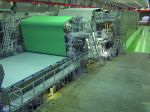Speciality papers for a digital age

Instead of representing a threat to print, the advance of digital media has brought the unique qualities of paper into sharper focus. Sappi is reaping the benefits with its speciality products
As the power and scope of digital media increases so the intrinsic qualities of paper are brought into sharper focus. Tactile, flexible and sustainable – the ‘paperless society’ seems the stuff of myths and legends. It is an area of Saxony where the tales of the Pied Piper of Hamlin and Snow White and the Seven Dwarfs originated that we find a very modern and prosperous paper mill. With a paper-making history going back to 1706, the Alfeld mill has been part of Sappi Fine Paper Europe since 1992, producing wood-free coated fine paper and speciality paper on five huge machines. Four categories have been developed to meet the needs of a wide range of customers: products for mainstream projects; quality papers/brands; innovative solutions; and papers produced for specific brands. Sappi delivers high quality products to enable its customers to maximise the possibilities with digital print while at the same time keeping costs down.
The mill supplies flexible packaging converters with high quality paper targeting key markets from cosmetics and perfumes through dairy and confectionary to spirits and tobacco. Its speciality papers include one-side coated for general labelling or face stock applications for self-adhesive labels; uncoated or one-side coated for flexible packaging applications; silicone-release base papers for adhesive or plotter film and tape; one and two-sided solid bleached board for premium packaging and graphics applications; and decorative liner for printed corrugated packaging.
Its Tempo brand, for example, is said to deliver a sharper quality image than other silk papers and is highly coated yet behaves like a gloss during the converting process, vividly representing colours and providing excellent finishing possibilities.
Always working to develop premium products to meet market demands, last year Sappi launched a bleached white liner that has the capability of delivering brilliant whiteness and vibrant colours.
Corrugated box liners
“Brand owners are increasingly using higher quality, more creative and eye-catching packaging to generate the perception of greater value and communicate with endusers,” comments marketing manager new business Kerstin Dietze. “Packaging plays a key role in making products more inviting, enhancing customer loyalty and delivering sales. As such it has become a vital element in the marketing mix.
“Mutli-colour printing – now commonly used in the liner market for corrugated boxes, shelf-ready packaging and displays, microflute consumer packaging and electronics goods packaging – work hand-inhand with design and materials to create the total shelf impact.”
With white-coated grey, brown boards or standard liners there is typically some shine through in the coating and it was this issue that drove the development of Fusion.
“Today designers are looking to create more natural skin and hair tones and to reproduce the corporate colours perfectly,” continues Dietze. “The whiteness offered by Fusion enables creamy tones to be created which other grades cannot match.”
As the market becomes more environmentally aware, there is a growing trend to use less material. Fusion can go down to 90 gsm without losing performance – the same look, touch, feel and whiteness can be offered across a range of weights.
Situated in central Europe, Sappi is well positioned to offer an extensive choice of media substances, sizes, diameters and widths with a flexible ordering system; orders may be changed at the last minute to accommodate unexpected variations.
Less downtime
Both reels and sheets can be supplied in the same delivery time with a minimum order of 1000 kilos. Recent trials found that companies running Fusion on sheeted material experienced less downtime related to washing intervals.
Because Fusion is tightly specified, its performance in the lamination process is 100% reliable, says Sappi. This in turn delivers constant process parameters, eliminating the need to make machine setup and glue adjustments. The use of less glue reduces moisture content, ensuring the substrate remains flat during conversion, resulting in a smoother production flow.
Furthermore, less energy is required for drying after lamination; the faster drying time speeds up production allowing diecutting to take place immediately.
“Fusion provides a conversion surface that offers very high brightness and whiteness,” explains environmental manager Jens Kriete. “Its strength prevents tearing at the edges or cracking at the creases, making it suitable for all kinds of finishing techniques.”
Available with PEFC or FSC certification, Fusion uses only virgin fibres which ensures its whiteness. By coating and calendaring the paper, the surface offers a special quality and gloss. Its availability in reels and sheets at 130 or 180 gsm allows a wide variety of applications by converters.
Sustainable practice
Sustainability is important to Sappi. The company strives to meet its commitments by promoting sustainable forestry, conforming to best environmental practice and legislation, reducing greenhouse gas emissions, increasing its use of renewable energy and improving quality.
“Alfeld can control the complete process from woodchips to paper which means it can manage the environmental impact of its products in a way that many other paper mills cannot,” concludes Kriete. “Today, around 48% of the primary energy we use comes from renewable sources.”
Despite the challenging economic situation of recent years, Sappi is optimistic about the future, reporting that all of its mills are currently in full production; its costs are 100 million Euros lower than last year due, in part to the closure of one of its mills. With a turnover of 66 billion Euros in 2010, Sappi Alfield’s ability to deliver tailormade solutions for customers’ individual requirements, means its prosperity is set to continue as long as there is a demand for high quality speciality papers for which it is seeing consistent growth from new developments.
Sappi Fine Paper Europe
T: +32 2 676 97 42

